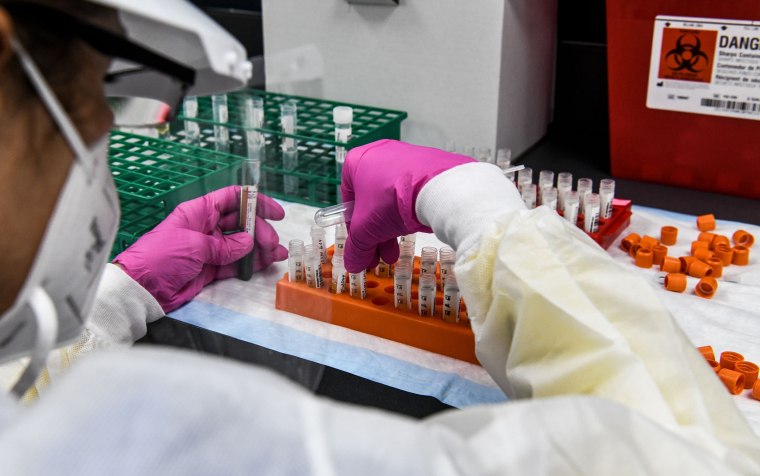An independent panel of advisers to the Food and Drug Administration overwhelmingly recommended that the agency authorize Moderna's Covid-19 vaccine for emergency use on Thursday, bringing the United States one step closer to adding a second vaccine to its toolkit in fighting the pandemic.
Members of the Vaccines and Related Biological Products Advisory Committee voted 20 to 0 in favor of recommending authorization, with one abstention.
Full coverage of the coronavirus outbreak
The FDA is expected to agree with the committee's recommendation, and an emergency use authorization could come as soon as Thursday evening or Friday.
Acting chair of the advisory group, Dr. Arnold Monto of the University of Michigan School of Public Health, called Moderna's work a "remarkable achievement."
"Based on the totality of scientific evidence available, I strongly support it because the benefits outweigh its risks," said Dr. Melinda Wharton, director of the Immunization Services Division in the National Center for Immunization and Respiratory Diseases at the Centers for Disease Control and Prevention.
Dr. Michael Kurilla, an infectious disease expert with the National Institutes of Health, was the sole member to abstain from the vote. He said he felt the question on which the committee voted, "Based on the totality of scientific evidence available, do the benefits of the Moderna Covid-19 vaccine outweigh its risks for use in individuals 18 years of age and older?" was too broad.
"I'm not convinced that for all of those age groups the benefits do actually outweigh the risks," Kurilla said. "And I would prefer to see it more targeted towards people at high risk of serious and life-threatening Covid disease."
On MSNBC earlier Thursday, Dr. Nahid Bhadelia, an infectious disease expert at Boston University School of Medicine, called it a "historic day," and said that the presumed addition of two other vaccines in Phase 3 clinical trials, from AstraZeneca and Johnson & Johnson, "will ensure that more Americans will get shots in their arms." Results from those trials are expected in early 2021.
Moderna developed the vaccine with the National Institute of Allergy and Infectious Diseases, part of the National Institutes of Health. The company also received funding for the research and development from Operation Warp Speed.
If authorized, the vaccine would be for adults, 18 and older.
Last week, the FDA authorized Pfizer-BioNTech's Covid-19 vaccine for those age 16 and above. Nearly 3 million doses of that vaccine were on target for delivery this week to health care workers and people in long-term care facilities. A second batch of doses has been reserved for the second shot, administered 21 days after the first.
Moderna's vaccine is also given in two doses, but 28 days apart. Clinical trials showed the vaccine was 94 percent effective in preventing symptomatic illness within two weeks after the second dose. Pfizer's has been shown to be similarly effective.
The vaccines from Pfizer and Moderna both work in the same way, using tiny snippets of genetic code called messenger RNA, or mRNA, to prompt the immune system into producing antibodies to the coronavirus, without using bits of the virus itself.
These are the first such vaccines to be authorized for use.
Any physical reaction to the shots — from minor redness at the injection site to life-threatening anaphylaxis — will be followed closely. This is largely because of four known cases of severe allergic reactions to the Pfizer vaccine.
Two health care workers in Alaska developed allergic reactions after receiving the Pfizer shot this week, and severe allergic reactions were also reported in two health care workers in the United Kingdom last week.
The events remain under investigation, and it is unclear whether there is a single component or ingredient in the Pfizer vaccine that could be causing the reactions.
Download the NBC News app for full coverage of the coronavirus outbreak
During the advisory committee meeting Thursday, representatives from Moderna said that among the more than 30,000 clinical trial participants, there were no cases of anaphylaxis that appeared to be related. (One participant developed anaphylaxis 63 days after getting the second dose. The reaction usually occurs immediately after exposure to an allergen.)
There was also discussion about whether people who have recently had cosmetic fillers could be at greater risk for temporary facial swelling after the shot.
Three people in Moderna's clinical trials who developed swelling in the face also had fillers, either in their cheeks or lips. Those procedures had been completed between two weeks and six months before vaccination.
Other milder side effects were indeed reported among those who received the Moderna vaccine, especially after the second dose.
The most common were pain, swelling, redness and tenderness in the injection area. Headache, fatigue, weakness, chills, nausea and joint pain were also reported. Bell's palsy, a facial paralysis, was reported in four study participants. Three were in the vaccine group, and one had received the placebo.
The advisory committee also addressed the potential impact of giving study participants who got the placebo the real vaccine so they, too, can benefit.
There are pros and cons to such a decision. The highest quality scientific data relies on analyzing the differences between those who got the placebo and those who got the actual vaccine or other medication.
But many ethicists believe the placebo volunteers deserve such protection.
Both Pfizer and Moderna have indicated they will offer placebo recipients the real vaccine.


